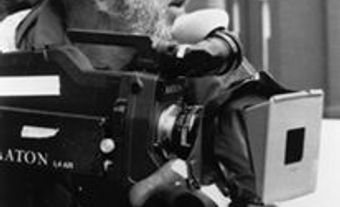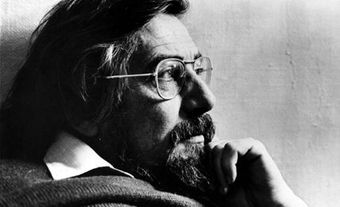
 Montréal, QC; died 10 August 1997 near Kuujjuag, QC). Often considered the enfant terrible of Québec cinema, Jean-Claude Lauzon emerged from a hardscrabble background and had a brief career as one of Canada’s most talented and truculent filmmakers before he was killed in a plane crash at age 43. His two feature films — Un zoo la nuit (1987) and Léolo (1992) — earned international acclaim and multiple awards; the latter is generally considered among the best Canadian films ever made.
Montréal, QC; died 10 August 1997 near Kuujjuag, QC). Often considered the enfant terrible of Québec cinema, Jean-Claude Lauzon emerged from a hardscrabble background and had a brief career as one of Canada’s most talented and truculent filmmakers before he was killed in a plane crash at age 43. His two feature films — Un zoo la nuit (1987) and Léolo (1992) — earned international acclaim and multiple awards; the latter is generally considered among the best Canadian films ever made.
Early Years and Career
Raised in a troubled family with a history of mental illness in Montréal’s impoverished St Dominique Street neighbourhood, Lauzon dropped out of high school and left home at age 16. He worked a series of odd jobs and lived with an assortment of bikers, gang members and petty crooks. After a creative writing assignment he had completed in school found its way to André Petrowski (then head of French film distribution at the National Film Board), Petrowski took the sensitive and intense Lauzon under his wing, and encouraged him to return to school and pursue his artistic side.
While a communications student at the Université du Québec à Montréal, Lauzon made a short film — Super Maire l'homme de 3 milliards (1979), a satire directed at long-running Montréal mayor Jean Drapeau — that won the Norman McLaren Award at the Canadian Student Film Festival. His first professional short work, Piwi (1981), which details the nightmares of a poor delivery man, was completed at the American Film Institute in Los Angeles and won a jury prize at the Montréal World Film Festival.

Film Career
After earning acclaim as a director of television commercials, Lauzon wrote and directed his debut feature, Un zoo la nuit (1987), a cross between a crime film and a story of reconciliation between a father and son. Employing strong, direct images and skillfully alternating between tenderness and violence, the film debuted at the Cannes Film Festival, won prizes at major international film festivals and went on to win an unprecedented 13 Genie Awards, propelling Lauzon to the forefront of Canadian film.
Lauzon then undertook a more ambitious project, Léolo (1992), a surrealistic, pseudo-autobiographical fantasy that chronicles the tragic adventures of 12-year-old Leo Lozeau, a creative boy growing up in a wildly dysfunctional family in working-class Montr![]() eal. Once again, Lauzon favoured a construction made up of a succession of shocking and startling scenes
eal. Once again, Lauzon favoured a construction made up of a succession of shocking and startling scenes

Léolo, which Lauzon dedicated to Petrowski, earned comparisons to the work of Fellini and Truffaut, and was met with widespread praise upon its release. American critic Roger Ebert called the film “one of the year’s best. I have never seen one like it before.” It was named the best film of 1992 by Maclean’s magazine – Brian D. Johnson’s review, titled “Rebel Masterpiece,” said that the film “elevates Canadian cinema to new heights of ambition and achievement” — and one of the top 10 films of 1993 by Time magazine in the US, which also included Léolo on its 2005 list of 100 “ALL-TIME” best films.
Lauzon was as famous for his arrogant, petulant persona and his histrionic, inflammatory outbursts as he was for his films. He potentially sabotaged Léolo’s chances of winning an award at Cannes, where it was favoured by some to win a top prize, by making an off-colour remark to juror Jamie Lee Curtis, and then nearly got into a fist fight with another juror on the flight out of Cannes. Uncompromising in his artistic vision, he turned down an offer from Norman Jewison to direct a Gene Hackman thriller, among various other offers from Hollywood. He was at odds with Québec’s cultural bureaucracy and once refused a $100,000 film prize in protest of the bureaucratic nature of Québec’s film funding. He continued instead to make a living directing television commercials.

Death
Lauzon was reportedly in development on his third feature film when he was on a fishing trip with his girlfriend, popular television actress Marie Soleil Tougas, in August 1997. The Cessna he was piloting crashed into a mountain near Ungava Bay in Northern Québec, killing them both.
Legacy and Tributes
Lauzon’s premature death is widely considered a great loss for film art. Technically brilliant, visually stylish and imaginative, his two feature films are linked by their aesthetic. Both are almost post-modern in their mixture and contrast of styles. Both deal with a family theme, the absence of the father and the central character’s quest for identity.
Film scholar George Melnyk summarized Lauzon’s legacy by noting that “critics everywhere were divided between those who passionately defended the films and those who complained they were marred by basic flaws of style and narrative. There were also complaints about the violence and the treatment of sexuality in his films, and the films’ ideological implications also came under scrutiny, especially in Québec.” Among Lauzon’s biggest supporters was Roger Ebert, who, reflecting upon Léolo in 2005, wrote: “Lauzon was filled with quirks and impulses, sudden inspirations and wild inventions. Some directors with such hyperactive imagination create movies that are elaborate and yet empty; Lauzon is so motivated by his resentments and desires that everything he creates is pressed into the cause and filled with passion.”

Lauzon Lauzone, a documentary on Lauzon by Louis Bélanger and Isabelle Hébert, was released in 2001. André Petrowski recounted his relationship with Lauzon and published a number of his early poems in the book Jean-Claude Lauzon: Le poète (2006). Many of these poems were set to music and recited by such prominent Québec artists as Pascale Bussières, Pierre Flynn and Jean Leloup on the album Le Zoo: Un hommage à Jean-Claude Lauzon (2007).
Awards
- Norman McLaren Award (Super Maire l'homme de 3 milliards), Canadian Student Film Festival (1979)
- Jury Prize (Piwi), Montréal World Film Festival (1981)
- Best Canadian Film (Un zoo la nuit), Montréal World Film Festival (1987)
- International Critics’ Award, Toronto Festival of Festivals (now the Toronto International Film Festival) (1987)
- Grand Prix (Un zoo la nuit), Ghent International Film Festival (1987)
- Achievement in Direction (Un zoo la nuit), Genie Awards(1988)
- Best Screenplay (Un zoo la nuit), Genie Awards (1988)
- Best Motion Picture (Un zoo la nuit), Genie Awards (1988)
- Best Original Screenplay (Léolo), Genie Awards (1992)
- Best Canadian Feature Film – Special Jury Citation (Léolo), Toronto Festival of Festivals (1992)
- Best Canadian Screenplay (Léolo), Vancouver International Film Festival (1992)
- Golden Spike Award (Léolo), Valladolid International Film Festival (1992)
More Paintings of Remarkable Québécois
Further Reading
André and Nathalie Petrowski, eds., Jean-Claude Lauzon: The Poet (Global Art, 2006).
George Melnyk, One Hundred Years of Canadian Cinema (Toronto: University of Toronto Press, 2004) and George Melnyk, ed., Great Canadian Film Directors (Edmonton: University of Alberta Press, 2007).

 Share on Facebook
Share on Facebook Share on X
Share on X Share by Email
Share by Email Share on Google Classroom
Share on Google Classroom



